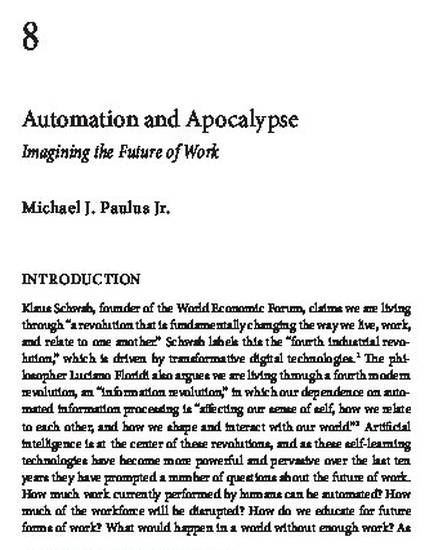
Contribution to Book
Automation and Apocalypse: Imagining the Future of Work
AI, Faith, and the Future
(2022)
Abstract
This chapter provides an orientation to the history of technology, work, and the theology of work and then explores three visions of the future of work—a literary dystopia, a philosophical utopia, and a theological apocalypse—as resources for understanding the significance of work and imagining its future. In the first vision, found in Kurt Vonnegut’s speculative novel Player Piano, automation leads to the end of meaningful work and nearly renders humans obsolete. This dystopic vision reveals the value of human work but remains skeptical about our ability to preserve it against the advances of automation. The second vision comes from John Danaher’s Automation and Utopia, which is a philosophical argument for the end of work through automation and for the creation of a utopia in which humans find meaning in a post-work world. This utopian vision reveals what is lost in a world without work and imagines what might be substituted for it. The third vision, from the end of the apocalyptic book of Revelation, considers how work and automation may participate in the transformation of the world. The chapter closes with a consideration of how this apocalyptic vision can inform our present and emerging world of human and automated work.
Disciplines
Publication Date
2022
Editor
Michael J. Paulus, Jr., and Michael D. Langford
Publisher
Pickwick Publications
Citation Information
Michael J. Paulus. "Automation and Apocalypse: Imagining the Future of Work" Eugene, Ore.AI, Faith, and the Future (2022) Available at: http://works.bepress.com/michael_paulus/83/
